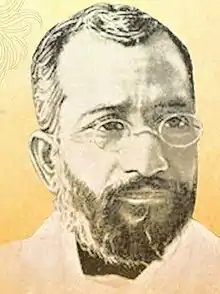Madhusudan Rao
Madhusudan Rao (29 January 1853 - 28 December 1912) was an Odia poet and writer from India. He was known as Bhaktakavi.
Madhusudan Rao | |
|---|---|
 | |
| Born | 29 January 1853 Puri, Odisha India |
| Died | 28 December 1912 (aged 59) |
| Occupation | Poet, essayist |
| Nationality | Indian |
| Genre | Poetry |
| Notable works | Prabandhamala |
| Children | Abanti Rao |
| Relatives | Reba Ray (niece) |
Life
Madhusudan Rao was born on 29 January 1853 in Puri, Odisha. His father was an employee of the police department of the state of Orissa and was transferred to different places during his career. As a result, Madhusudan had his schooling in different parts of Odisha - Gop, Cuttack, Bhubaneswar and Puri. After passing his F. A. from Ravenshaw College in 1871, he stopped studying, as, at the time, there were no colleges or other facilities offering a B. A. in the whole of Odisha. He started a career as a teacher in 1871. He taught at various places. In 1890, he became Deputy Inspector of Education.
He died on 28 December 1912.[1]
Works
He is known as Bhaktakavi of Odia and is considered the father of modern (using western lyrical forms) Odia poetry.
- In collaboration with Radhanath Ray, he published two volumes, one each in 1873 and 1874, of collections of poems entitled Kavitabali. They heralded a new era in Odia poetry. In this collection, Rao replaced the old lyrical forms like chautisa, koili, boli, padia, etc., with western lyrical forms like the ode, the elegy, the sonnet, etc.
- His other poetry collections, which also consist of compositions used as lyrics for songs, comprise:
- Chhandamala (Vol. 1, 188; Vol. 2, 1895),
- Sangitamala (1894),
- Basanta Gatha (1910),
- Kusumanjali (1903) and
- Utkalgatha (1908).
- Prabandhamala, published in 1880, is a collection of essays in Odia.[2][3]
- Apart from writing essays, he translated a few works from Sanskrit and English into Odia. They were published in Utkal Darpan, a literary journal.
- He wrote two short stories.
- He translated the Uttararamacarita of Bhavabhuti into Odia.
- He also contributed to children's literature.[2]
- Rao, Madhusudan (1898). Chandamala (in Odia). The Arunodya Press. OCLC 499869715.
- Rao, Madhusudan (1901). Mahadebi Bhiktoria (in Odia). The Utkal Sahitya Press. OCLC 499865497.
- Rao, Madhusudan (1983). Madhusudana granthabali (in Odia). Grantha Mandira. OCLC 499128674.
- Rao, Madhusudan (1912). Ucca siksaka suhrda (in Odia). OCLC 1046989696.
- Rao, Madhusudan (1922). Karnna badha (in Odia). The Brajendra Press. OCLC 499865888.
- Rao, Madhusudan (1983). Basanta Gatha (in Odia). Phrends Pablisars. OCLC 499610376.
- Rao, Madhusudan (1944). Barnabodha (in Odia). The I.S.S.D. Press. OCLC 499519106.
- Rao, Madhusudan; Kabi, Asita (1972). Kusumañjali : alocana saha (in Odia). Niushtudentas Shtora. OCLC 6304045.
References
- Binod Sankar Das (1986). Glimpses of Orissa. Punthi Pustak. p. 138. Retrieved 5 March 2018.
- Mohan Lal (2007). Encyclopaedia of Indian Literature: Navaratri-Sarvasena. New Delhi: Sahitya Akademi. pp. 3585–3586. ISBN 81-260-1003-1.CS1 maint: ignored ISBN errors (link)
- Swarupa Gupta (30 October 2017). Cultural Constellations, Place-Making and Ethnicity in Eastern India, c. 1850-1927. Boston: BRILL. p. 80. ISBN 978-90-04-34976-6. Retrieved 5 March 2018.
| Wikimedia Commons has media related to Barnabodha. |